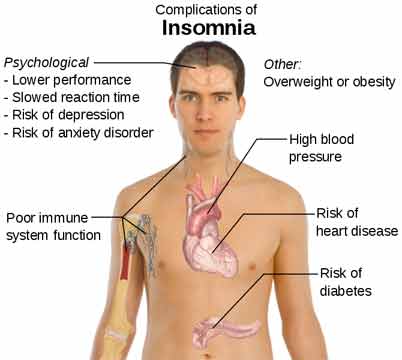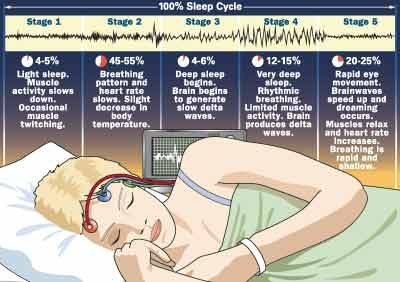|
InsomniaAre you Getting Enough Sleep ?How Much Is Enough?A good laugh and a long sleep are the best cures in the doctor's book.......Irish Proverb Insomnia is a condition which can cause a great deal of suffering and worry. Although sleep needs vary, most healthy adults need seven to nine hours a night. However, some people are able to function on as little as six and others can’t function to their potential unless they have ten hours sleep. Contrary to common myth, the need for sleep doesn’t decline with age (although the ability to get it all at one time may be reduced). Hence, the senior moment or siesta. As people age, they often nod off at different times during the day, especially after a large meal. 
You will know if you are not getting enough if you experience some or all of these symptoms: taking more than 30 minutes to fall asleep at night; waking frequently during the night — or too early in the morning — and finding it difficult getting back to sleep. If you don’t feel refreshed when you wake up in the morning or pass the day in a semi-comatose state, or fighting the urge to nod off, especially during boring meetings or activities, chances are you are not getting enough sleep for your needs. This leads to sleep deprivation that often affects you in ways you don’t realize. Why Do We Need Sleep?Insomnia can sabotage your efforts to age well. Sleep is essential for good health, not just physically, but also for your mental and emotional functioning and safety. Researchers belief that chronic insomnia may lead to psychiatric problems in the long run, so its importance should not be underestimated. People suffering from a sleep disorder called sleep apnoea are at risk for high blood pressure, heart attacks, stroke and even car crashes, if the condition is left untreated. Being overweight increases the risk for sleep apnoea. But even the occasional attack of insomnia can make life more stressful and the sufferer less productive, making concentration difficult, and stress hard to handle. Sleep loss impairs the memory, learning and reasoning functions and may contribute to failure at school or at work, without taking into account the strain on marriages and relationships with offspring. If you are unreasonably irritable with co-workers, family or friends and have difficulty in remembering facts, the chances are your sleep deprivation is responsible for your state of mind. More seriously, from a safety point of view, lnsufficient sleep can lead to serious or even fatal accidents in the factory or on the road. Is All Sleep the Same?Insomnia means that your normal sleep patterns have become inbalanced. Normal sleepers have a relatively predictable sleep pattern, alternating periods of REM (rapid-eye-movement) when one is dreaming and non-REM sleep. REM sleep is characterized by a high level of mental activity, with, your heart rate, blood pressure and breathing similar to what you experience when you are awake.

Getting enough sleep without interruptions from your environment or from internal factors, such as breathing, is more likely to maintain the necessary combination of REM and non-REM sleep that is restful and restorative. Who is at Risk?Although mostly everyone suffers from the occasional night of poor sleep, some people are particularly vulnerable to insomnia or non-restorative sleep. These individuals include students, shift workers, travellers, and persons suffering from acute stress, depression, or chronic pain. Also people who are obliged to work long hours and multi-task are often subject to sleep deprivation. As one ages sleep difficulties become more common, but inadequate sleep is not an inevitable part of the aging process. The total amount of sleep needed stays the same, but health problems, pain or the effects of medication can cause lack of sleep at this period of life. Psychological Factors can trigger sleep problems, including difficulties such as bullying at school or at work, family problems and marriage breakdown or serious illness or death of loved ones. More often than not, the insomnia disappears when the problem is resolved, but if short time sleep deprivation is not treated early enough, it can persist after the original stress is long gone. That’s why it’s a good idea to talk to a physician about any sleeping problem that recurs or persists for longer than one week. The doctor will be able to diagnose any problems causing the condition, such as depression or anxiety, and prescribe the necessary treatment. Your doctor can help you take steps early to control or prevent poor sleep patterns becoming chronic. Since insomnia can also be brought on by depression, evaluation by a healthcare professional is essential.
Other Factors Which Can Provoke InsomniaShift Work, jet lag caused by crossing time zones and noise from neighbours or the street can also disrupt sleep patterns. If your partner snores or has difficulties sleeping or is restless at night, this will also affect you. Painful conditions such as arthritis, back pain, apnoea and restless leg syndrome and other conditions which cause involuntary limb movements during sleep, can also be a problem which should be referred to a doctor. Sleep apnoea can be relatively serious and anyone who suspects that they or their partner suffers from this condition, should consult a health professional as early as possible. Apnoea symptoms are easily recognizable as the sufferer snores loudly and often stops breathing for an alarming duration that causes brief awakenings throughout the night and daytime fatigue For women, pregnancy and hormonal shifts including those that cause premenstrual syndrome (PMS) or menopause and its accompanying hot flashes can also intrude on sleep. Medication, such as decongestants, steroids and some medicines for high blood pressure, asthma, or depression can cause sleeping difficulties as a side effect. Lifestyle Changes Could Help
You could of course be sabotaging your own sleep by your life style. You must make sure that you have eliminated certain activties which might have caused or contributed to your insomnia. Cut down on alcohol, tea and coffee, coca cola and any other beverages containing caffeine in the afternoon and evening, eat a light meal at night and do not exercise close to bedtime, Try to follow a regular schedule and get to bed and get up at the same time as far as possible. Working or doing other mentally intense activities before bedtime should also be avoided. Rather than tossing and turning in bed, get up and do something else and go to bed when you are feeling tired. If a book helps you fall asleep, by all means read a few pages, but the type of book that is difficult to put down is too stimulating and should be avoided. If the suggestions above don’t help, it is really important to consult your doctor who will be able to determine the underlying problem or, if not, refer you to a special centre which can monitor your sleep patters and discover your problem. Do not neglect this problem if it has been going on for some time. Sleep is necessary for your long-term health and you should not underestimate its importance. Back from Insomnia to age-well.org |





